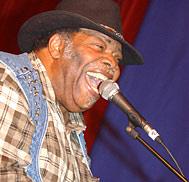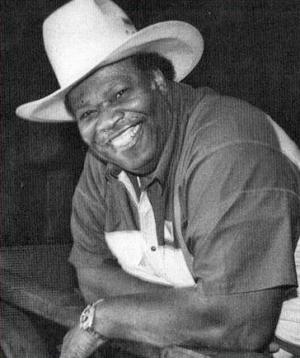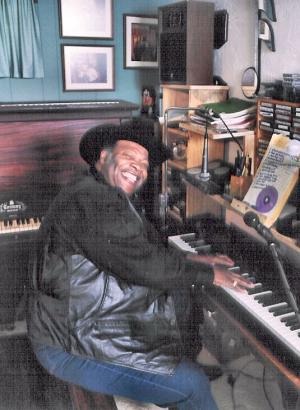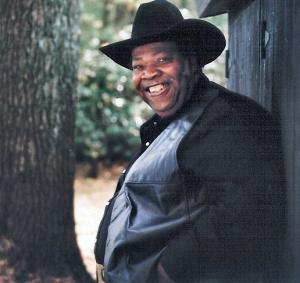DAVE'S DIARY - 10 JULY 2005 - BIG AL DOWNING OBITUARY
BIG AL DOWNING RIP AT 65
BORN LENAPAH, OKLAHOMA - JANUARY 9, 1940.
DIED WORCESTER, MASSACHUSETTS - JULY 4, 2005
FROM OKLAHOMA TO HALL OF FAME
 |
Country
icon Big Al Downing has died at 65 after a long battle with leukemia. After his 1978 single, Mr. Jones reached #20 on country chart he scored his biggest hit a year later when Touch Me (I'll Be Your Fool Once More) peaked at #18. |
Downing,
who was in the Rockabilly Hall of Fame, last hit the top 20 in 1980 with
Bring It On Home.
His finale public performance was in May in Nashville at the Grand Ole
Opry when he played his hit Mr. Jones.
Downing concentrated on European markets in recent years and was planning
another overseas tour before being hospitalised in late June.
In 2003, he released the CD One of a Kind and was recording tracks
for an upcoming project when his leukemia worsened.
Downing is survived by his wife of 27 years, Beverly, and four stepsons,
five brothers and five grandchildren.
Funeral services were held on July 9 at Our Lady of the Rosary Church
in Spencer, Massachusetts.
CHILDHOOD
| Downing
was born at Lenapah in rural Oklahoma into a family of 12 children. He spent his early childhood tending the horses and cattle his family raised, and singing with two brothers, his father, and a sister in a Gospel group. By the time he was 10, he was teaching himself to play on an old, upright piano that had 40 working keys out of 88. Four years later, he was performing at community functions and high school proms. Downing grew up listening to country legends Ernest Tubb and Hank Williams on Nashville radio station WSM-AM. He also heard rhythm & blues stylists such as Fats Domino on another Nashville station, WLAC. |
 |
Several years later, Downing performed the Domino hit Blueberry Hill to win first prize in a talent contest sponsored by a radio station in Coffeyville, Kansas.
Local singer
Bobby Poe heard his performance and invited him to join his mulit-racial
band, the Poe Cats.
In accepting the offer, Downing turned down a basketball scholarship at
Kansas State University.
After playing with Poe in Kansas and Oklahoma, Downing became keyboardist
and background vocalist for rockabilly queen, Wanda Jackson.
In addition to appearing at concerts with Don Gibson, Marty Robbins, Bobby
Bare and others, Downing played on Jackson's most famous record, Let's
Have a Party, in 1960.
The single was an enormous hit in Japan and Europe, reaching #32 in the
U.K. and Top 40 on the U.S. Pop chart.
SOLO CAREER
Big Al and
others in the band left Oklahoma for Boston and worked seven days a week
- including two jam sessions on Saturday and Sunday - from 1:00 pm until
1:00 am for $90.00 a week.
"That's what I really called payin' dues," Downing later revealed.
From 1957 to 1964, Downing played with his band and had recordings released
as a solo artist for White Rock, in 1958 and later Columbia and Carlton.
His best effort was a cover of Marty Robbins' Story of My Life.
As a solo artist, he and his band the Chartbusters charted two rock songs
in 1964.
A soul duet with Little Esther Phillips made the charts in 1963, and a
disco record charted in 1975.
Big Al embarked on tours of England, Spain, Holland, Germany, Sweden,
Isle of Malta, Libya, North Africa, Italy, France, Luxembourg, Greece,
the Far East, Hong Kong, Singapore, Japan, Philippines, Guam, Hawaii,
and Thailand, where he played for the King.
During these overseas tours he played with Johnny Mathis, Dottie West,
Lou Rawls, the Drifters and Fats Domino.
Domino recorded two Downing songs Mary, Oh Mary and Heartbreak
Hill.
In 1973 he recorded for Lenox Records, and had the Top 80 Pop hit, You'll
Never Miss The Water (Till The Well Runs Dry) - the duet with Little
Esther Phillips.
Later, he signed with Warner Brothers.
In 1974, Al released a single I'll Be Holdin' On that made the disco charts
in America and Europe.
COUNTRY CAREER
 |
In
1978 he hit the Top 20 with Mr. Jones and Touch Me (I'll
Be Your Fool More), the following year that peaked at #18. I'll
Be Loving You went Top 50, followed by Darlene, into
the lower 60s, both in 1982. |
The Best
Of Families reached the Top 50 in 1984, and that year saw Al's final
Team hit, There'll Never Be A Better Night For Being Wrong that
only made the Top 80.
In 1987, Big Al signed with the Vine Street label, which released Oh
How Beautiful You Are (To Me) and Just One Night Won't Do,
both that only reached the Top 70. Two years later he was signed with
Door Knob Records and had the 1989 Top 100 hit, I Guess By Now
- Al's only chart entree with that label.
Among other artists to cut Downing compositions were Bobby Blue Bland,
Tom Jones and Webb Wilder.
RACISM
| Before
Charley Pride broke country music's racial barrier in 1966, Downing
faced considerable hardships while attempting to make a living just
a few years earlier. In a 2003 interview with CMT Wanda Jackson talked about the obstacles Downing faced during the early '60s simply because of his race. "He couldn't eat in most of the restaurants," Jackson said. "He couldn't eat in the hotel restaurants. They'd have to take his food out to the car. On our jobs, he couldn't even use the men's restroom. He had to stay on the stage. The guys would bring him Cokes and things. It was very hard on Al. We've all asked him how he put up with it, and he said, 'It's for the music.'" |
 |